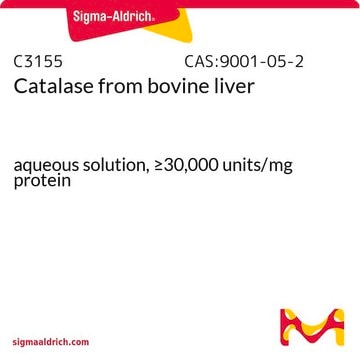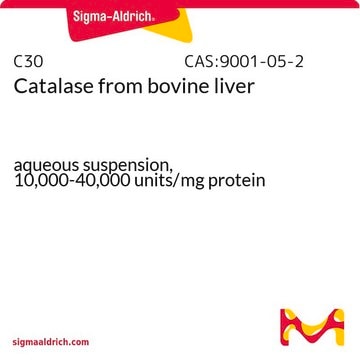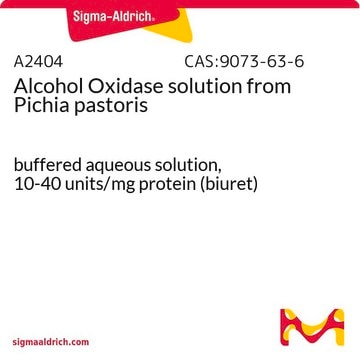P4234
Pyranose Oxidase from Coriolus sp.
recombinant, expressed in E. coli, ≥2.7 units/mg solid
Szinonimák:
Pyranose: Oxygen 2-Oxidoreductase
Bejelentkezésa Szervezeti és Szerződéses árazás megtekintéséhez
Összes fotó(2)
About This Item
CAS-szám:
MDL-szám:
UNSPSC kód:
12352204
NACRES:
NA.54
Javasolt termékek
rekombináns
expressed in E. coli
Minőségi szint
form
powder
specifikus aktivitás
≥2.7 units/mg solid
kiszállítva
wet ice
tárolási hőmérséklet
−20°C
Általános leírás
Pyranose oxidase (P2O), a homotetrameric protein consists of a covalently bound flavin adenine dinucleotide (FAD). It is seen mostly among wood-degrading basidiomycetes.
Alkalmazás
Pyranose Oxidase from Coriolus sp. has been used in the enzymatic oxidation of D-glucose (DG). It has also been used as a component in oxygen scavenging system (OSS) to increase the lifetime of the fluorophores.
Biokémiai/fiziológiai hatások
Pyranose oxidase (P2O) can be used in clinical chemistry to determine 1,5-anhydro-d-glucitol marker, used for glycemic control in diabetes patients.
Pyranose oxidase (P2O) catalyzes the oxidation of aldopyranoses at position C-2 to yield the corresponding 2-ketoaldoses. The in vivo substrates of P2O are thought to be D-glucose, D-galactose, and D-xylose. They are oxidized to 2-keto-D-glucose (D-arabino-hexos-2-ulose, 2-dehydro-D-glucose), 2-keto-D-galactose (D-lyxo-hexos-2-ulose, 2-dehydro-D-galactose), and 2-keto-D-xylose (D-threopentos-2-ulose, 2-dehydro-D-xylose), respectively. Pyranose oxidase has significant activity with carbohydrates such as, L-sorbose, D-glucono-1,5-lactone, and D-allose. When pyranose oxidase catalyzes the oxidation of aldopyranoses, electrons are transferred to molecular oxygen which results in the formation of hydrogen peroxide.
Egység definíció
One unit produces 1.0 μmol of hydrogen peroxide per minute at 37 °C, pH 7.0.
Egyéb megjegyzések
Contains glutamate
Figyelmeztetés
Danger
Figyelmeztető mondatok
Óvintézkedésre vonatkozó mondatok
Veszélyességi osztályok
Resp. Sens. 1
Tárolási osztály kódja
11 - Combustible Solids
WGK
WGK 1
Lobbanási pont (F)
Not applicable
Lobbanási pont (C)
Not applicable
Analitikai tanúsítványok (COA)
Analitikai tanúsítványok (COA) keresése a termék sarzs-/tételszámának megadásával. A sarzs- és tételszámok a termék címkéjén találhatók, a „Lot” vagy „Batch” szavak után.
Már rendelkezik ezzel a termékkel?
Az Ön által nemrégiben megvásárolt termékekre vonatkozó dokumentumokat a Dokumentumtárban találja.
Az ügyfelek ezeket is megtekintették
Tien-Chye Tan et al.
Journal of molecular biology, 409(4), 588-600 (2011-04-26)
Trametes multicolor pyranose 2-oxidase (P2O) is a flavoprotein oxidase that oxidizes d-glucose at C2 to 2-keto-d-glucose by a highly regioselective mechanism. In this work, fluorinated sugar substrates were used as mechanistic probes to investigate the basis of regioselectivity in P2O.
Wouter Van Hecke et al.
Bioresource technology, 100(23), 5566-5573 (2009-07-15)
The interactions between two oxidoreductases coupled by an artificial redox mediator have been described quantitatively to increase both stability and productivity. In this cascade oxidation, pyranose 2-oxidase oxidizes several aldoses at the C-2 position to 2-ketoaldoses. A redox mediator is
Oliver Spadiut et al.
The FEBS journal, 277(13), 2892-2909 (2010-06-10)
Pyranose 2-oxidase from Trametes multicolor is a 270 kDa homotetrameric enzyme that participates in lignocellulose degradation by wood-rotting fungi and oxidizes a variety of aldopyranoses present in lignocellulose to 2-ketoaldoses. The active site in pyranose 2-oxidase is gated by a
Mor R Alkaslasi et al.
Nature communications, 12(1), 2471-2471 (2021-05-02)
In vertebrates, motor control relies on cholinergic neurons in the spinal cord that have been extensively studied over the past hundred years, yet the full heterogeneity of these neurons and their different functional roles in the adult remain to be
Purification and characterization of pyranose oxidase from the white rot fungus Trametes multicolor.
C Leitner et al.
Applied and environmental microbiology, 67(8), 3636-3644 (2001-07-27)
We purified an intracellular pyranose oxidase from mycelial extracts of the white rot fungus Trametes multicolor by using ammonium sulfate fractionation, hydrophobic interaction, ion-exchange chromatography, and gel filtration. The native enzyme has a molecular mass of 270 kDa as determined
Tudóscsoportunk valamennyi kutatási területen rendelkezik tapasztalattal, beleértve az élettudományt, az anyagtudományt, a kémiai szintézist, a kromatográfiát, az analitikát és még sok más területet.
Lépjen kapcsolatba a szaktanácsadással











